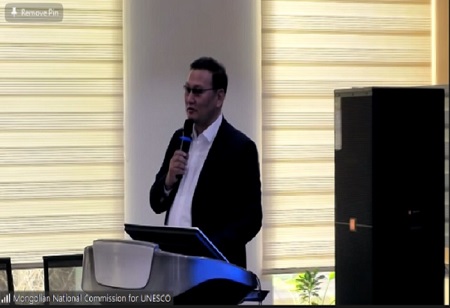The 1st International Forum on Higher Education in Mongolia took place in Ulaanbaatar. The forum was organized jointly by the Mongolia Ministry of Education and Science (MoES), the Mongolia National Commission for UNESCO, UNESCO Multisectoral Regional Office for East Asia, with solid support from UNESCO UIL, the International Association of Universities, UNESCO Multisectoral Regional Office in Bangkok, European Network for Quality Assurance, and the Higher Education Section of UNESCO Headquarters. H. E. G. Zandanshatar, Speaker of the Parliament of Mongolia, H. E. L. Enkh-Amgalan, Minister of Education and Science of Mongolia, Prof. Shahbaz Khan, Director and Representative of UNESCO Multisectoral Regional Office for East Asia, Mr. Boldsaikhan Sambuu, Secretary-General of the Mongolian National Commission for UNESCO, gave their opening speeches at the forum.
In his opening speech, H. E. G. Zandanshatar acknowledged Mongolia’s rapid technological developments and progress in the field of higher education and emphasized the imperative need for enhanced capacity to confront the challenges of contemporary society. He also recognized the blueprint 2030 Roadmap for Higher Education and call upon Mongolian universities to enhance the quality of higher education for a digital and green economy. H. E. L. Enkh-Amgalan stated in his speech that the Forum is being organized at the right time when Mongolia had recently passed a package of laws of education that covers all stages and fields of education. He highlighted his Ministry’s vision to reshape the higher education sector to meet the demands of the knowledge economy. His excellency highlighted the key milestone achievements in higher education in Mongolia.
He reiterated his call for continued dialogue and active engagement by the higher education stakeholders and participants, particularly in transforming higher education that links to the quality of higher education and aligned with the needs of the labor market. He highlighted the areas that need urgent attention such as university teacher quality, accreditation, academic freedom, assessment and evaluation framework, digital transformation, technical and vocational education and training, curriculum reform, nation-wide university ranking system, student mobility and international cooperation, etc.
Prof. Shahbaz Khan acknowledged the collaboration with the MoES and the Mongolia National Commission for UNESCO in organizing this first forum devoted to higher education. He recalled the six core action areas called by the UNESCO Higher Education Roadmap 2030 and reiterated the importance of improving the quality and relevance of higher education in Mongolia guided by the key recommendations of the Third World Conference in Higher Education. He reassured all higher education stakeholders that UNESCO is fully committed to providing technical support and advice to transform higher education in Mongolia to contribute towards the achievement of the SDG4 and 2030 Agenda for Sustainable Development.
Mr. Boldsaikhan Sambuu in his speech recognized the urgent need to establish a more robust higher education system in Mongolia. He informed the participants that Mongolia is a leading country in higher education transformation and was among the few countries invited by UNESCO HQ to share its experiences in higher education reform and restructuring of the higher education sector. Before Session 1, Kh. Tamir, Director of the Higher Education Department of Mongolia, delivered a keynote address on the New Legal Environment - New Opportunities for Higher Education in Mongolia. He highlighted key amendments to the existing higher education law, curriculum activities, financing, quality assurance, and government decisions. Prof. Asha S. Kanwar, President of the Commonwealth of Learning, (COL) presented the keynote address of the forum. Prof. Kanwar in her presentation, highlighted the Global Trends and Reform in Higher Education and Implications for Mongolia and presented five important trends in higher education.

